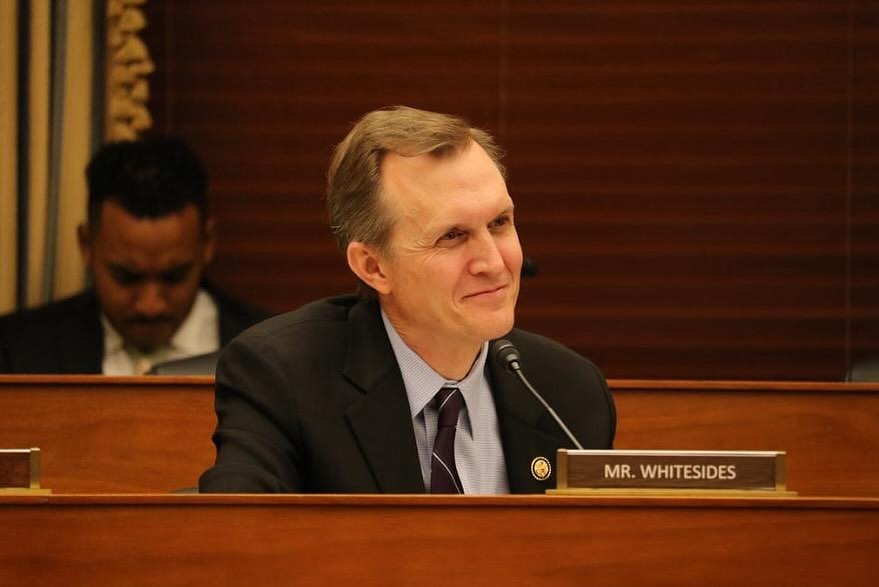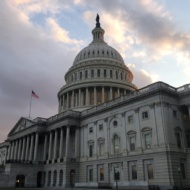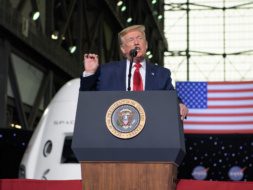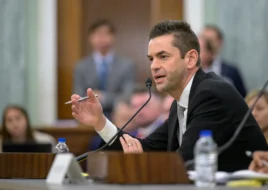Amid the White House’s chaotic push to reorient space policy around the private sector, Rep. George Whitesides (D-CA) is at the center of the conversation.
The former CEO of Virgin Galactic and NASA chief of staff is starting his first term in the House with prominent positions in civil and national security space policymaking. He is serving as vice-ranking member of the House Science, Space and Technology Committee and a member of the House Armed Services Strategic Forces Subcommittee.
Payload caught up with Whitesides to talk about the fight for NASA’s budget, Jared Isaacman’s nomination to lead the space agency, and new commercial architectures for exploration.
This transcript is edited for length and clarity.
While we wait for the full president’s budget, what’s happening behind-the-scenes to push back against the proposed cuts we’ve seen so far?
It’s just not going to be a NASA that looks like NASA today. Now, is that their intent? I guess so. But I don’t think that’s the intent of Congress, particularly for folks on the science committee [and] folks inside the Appropriations Committee. How that translates, though, into an outcome at some point for FY26 is anybody’s guess right now. All we can do at this point is to highlight the practical impact of those cuts, which is a full-scale assault on our marquee space agency.
The budget does feel divorced from any evaluation of NASA’s various activities.
If you go back to the first Trump administration, you had a National Space Council led by a competent, experienced government worker. You had a vice-president who was interested in space and who, to be honest, protected NASA from a lot of the insanity that we saw circulating in other agencies, and inside the White House. I hope that we can have that situation again.
I don’t know if we will. From what I can see, the vice-president is not particularly interested in space or NASA. We don’t know the formulation or the personnel of the National Space Council, although I guess they have said that they are going to reconstitute it. So I think there’s a lot of uncertainty right now around national space policy, both civil and military.
What can NASA do to make space policy debates more substantive?
That needs a Senate-confirmed leader. Without that, what happens is that people outside of the agency, who don’t know about the agency, and—frankly—don’t know much about science, are making decisions about this thing that we’ve spent 60-plus years building. And that is super-dangerous. So it is really important that we get a Senate-confirmed administrator as quickly as possible, and I’m hopeful that we’re close to that.
You’ve endorsed President Trump’s nominee, Jared Isaacman, for that job. What does he bring to the agency?
Having somebody who has experience both in space and in aeronautics is rare in NASA’s history, and then to combine that with somebody who has deep experience leading large organizations is something that could be a good leadership set for the next administrator. As you’ve seen from my public comments, I’m hopeful, and I think that there’s a lot of mischief that’s happening in this interim period where he’s not inside the A suite.
Are you concerned about potential conflicts of interest with SpaceX?
I myself have divested or sold any individual stock that I own as a Congress member, and I think that that is the right move. It’s important that people in leadership and government do what they can to take out the possibility of conflict of interest, or perceived conflict of interest.
One pivot we’re expecting in this administration is turning to public-private partnerships for Moon and Mars exploration. What’s your take on how to make those succeed?
At the end of the day, public-private partnerships work really well in general, as long as they’re structured properly and creating opportunities for the private sector to sell their goods to commercial sector customers. It worked extremely well in the case of launch. We need to take lessons around what kind of partnerships work and what are the underlying assumptions—or minimum conditions that will make things work in the future.
For the time being, the Moon’s primary customer is going to be governments. And does that mean that it’s impossible to have other customers? Not at all. But clearly, the government is going to be the main anchor customer, and so we have to be realistic about the partnerships that we set up. And if we are realistic, then I think we can have a lot of success.
The president is pushing a new missile defense scheme, Golden Dome—how do you look at that?
You know, we’re waiting on briefings to tell us what it actually is. It is purely this phrase that people love, but there’s no “there” there—yet. Obviously the nation has invested billions of dollars over the years in missile defense. So in some ways, this is a rebranding effort.
Maybe the most novel proposal is for space based missile interceptors. Is there an appetite for that kind of architecture in Congress?
I have big concerns about space-based interceptors, for obvious reasons. That doesn’t mean that I am dead-set against any implementation of them, but I think what we need to see from this administration is a more sophisticated analysis of how these systems interplay in a period of conflict, and also see evidence that they [the interceptors] can accomplish the mission that they’re asked to do.
From where you’re sitting, what else do we need to be paying attention to?
The cuts to NASA science are not getting enough attention…I don’t think anybody outside the community is thinking about it too much, because of everything else that’s going on. We have to realize that cutting the guts out of our science agencies is basically like gutting the future of America. The United States is leading the world in space technology, and we can’t give that up.
What everyone needs to understand is that these things are interconnected, right? It is really one industry underlying it all, and so cutting big parts out of it on the civil side will have inevitable impacts on the military side. And that kind of holistic thinking has so far not been very present coming out of the administration.




